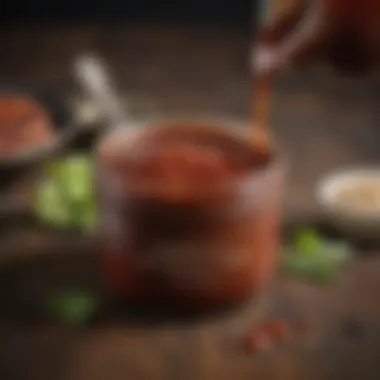Exploring the Richness of Carolina Style BBQ Sauce


Intro
Carolina style BBQ sauce stands out within the diverse landscape of American barbecue. Its uniqueness lies in its composition and origins, shaped by the cultural influences of the Carolinas. This sauce, unlike its counterparts from regions such as Kansas City or Texas, has a distinctive tanginess and sweetness, often attributed to its key ingredients. Understanding the nuances of Carolina style BBQ sauce is crucial for both home cooks and culinary enthusiasts, as it plays an integral role in barbecue traditions. This guide serves as an in-depth exploration of this sauce, offering insightful details on its history, composition, and variations.
Recipe Overview
Recipe Name and Description
The classic Carolina BBQ sauce is essentially a vinegar-based concoction, making it a versatile condiment that complements various meats, especially pork. Its piquant flavor profile elevates dishes, offering a delightful balance of acidity, sweetness, and spice. Often utilized as a finishing sauce, this blend adds a layer of complexity to barbecue preparations.
Cuisine Type
Carolina BBQ sauce belongs to Southern cuisine, a style renowned for its bold flavors and rich culinary heritage. This region's barbecue traditions heavily influence American barbecue practices, where sauce plays a pivotal role in dish portrayal and preparation.
Ingredients List
Detailed Ingredient Breakdown
The primary ingredients that characterize Carolina style BBQ sauce are:
- Apple cider vinegar: This acts as the backbone of the sauce, providing acidity and brightness.
- Brown sugar: Adds sweetness that balances the vinegar's sharpness.
- Red pepper flakes: Introduces a hint of heat, complementing other flavors.
- Ketchup: Mildly used in some versions, it adds to the depth of flavor.
- Salt and black pepper: Essential seasonings that enhance overall taste.
These components are available in most kitchens and can be easily sourced.
Substitutions for Dietary Needs
To accommodate differing dietary requirements, here are some substitutions:
- Gluten-free: Ensure any ketchup used is certified gluten-free.
- Low-sugar alternatives: Use sugar substitutes like stevia or monk fruit instead of brown sugar for a low-calorie version.
- Spiciness: Adjust the amount of red pepper flakes or use milder spices for those who prefer a gentler flavor.
By understanding these components, cooks can tailor the sauce to their specific tastes or dietary needs, ensuring that Carolina BBQ sauce can be enjoyed by many.
Prologue to Carolina Style BBQ Sauce
Definition and Overview
Carolina Style BBQ sauce is distinguished by its vinegar base, a crucial element that sets it apart from other regional barbecue sauces in the United States. Typically, it contains apple cider or white vinegar, creating a tangy flavor profile that complements smoked meats effectively. The sauce is often thin and runny, as opposed to the thicker, sweeter sauces popular in other parts of the country.
In addition to vinegar, key ingredients such as hot sauce, spices, and sometimes a hint of sugar contribute to its complex taste. This sauce pairs excellently with traditional Southern barbecue dishes, particularly pork, making it a staple in many households.
Historical Context
The origins of Carolina style BBQ sauce can be traced back to the unique culinary practices of the region. Early settlers, influenced by indigenous peoples and later African American culinary traditions, developed these recipes to suit the abundant local resources. Vinegar’s use was not merely for flavor; it served as a preservative in the hot and humid climate of the South.
The historical recipes reveal how different practices in Eastern and Western North Carolina led to distinctive variations in sauce styles. Eastern North Carolina style is known for its pure vinegar and pepper sauce, while Western North Carolina introduces a hint of tomato and sugar, showcasing regional preferences. These historical nuances illustrate the evolution of Carolina BBQ sauce, contributing to its status as a cultural icon in Southern cuisine.
Key Ingredients in Carolina Style BBQ Sauce
The foundation of Carolina style BBQ sauce lies in its key ingredients. Each element contributes unique flavors and enhances the overall barbecue experience. Understanding these ingredients is essential for home cooks wanting to replicate or innovate on traditional recipes. This section will detail the three main components: the vinegar base, sweeteners, and spices and seasonings. Together, they create a sauce that reflects the rich culinary heritage of the Carolinas.
Vinegar Base
Vinegar is the cornerstone of Carolina BBQ sauce, particularly in Eastern North Carolina style. It contributes a tangy flavor profile that cuts through the richness of smoked meats. The use of vinegar can be traced back to the early days of barbecue in the region, where preservation and flavor enhancement were paramount.
There are mainly two types of vinegar used: white vinegar and apple cider vinegar. While white vinegar offers a sharper taste, apple cider vinegar adds a subtle sweetness and complexity. The choice of vinegar affects not only flavor but the sauce's overall balance. Moreover, the acidity of vinegar works well to tenderize meat, ensuring juicy results when marinating or basting.


Sweeteners
Sweeteners serve to balance the acidity of the vinegar and introduce depth to the flavor. In Carolina style BBQ sauce, common sweeteners include brown sugar and honey. Brown sugar, with its molasses content, brings rich caramel notes to the sauce, helping to create a sticky texture that clings to the meat.
Using honey can impart a distinct floral character, creating a contrast with the tanginess. Other sweeteners, like maple syrup or even fruit purees, can also be used to introduce unique flavors. When measuring sweeteners, precision matters as too much can overwhelm the sauce and mask the vinegar's bite.
Spices and Seasonings
Spices and seasonings are what elevate Carolina BBQ sauce from basic to exceptional. Common spices include black pepper, red pepper flakes, and garlic powder. Black pepper provides aromatic heat while red pepper flakes introduce a level of spiciness that varies based on personal preference.
Garlic powder is often included for its savory depth. Some variations may include mustard powder or other regional spices, depending on family recipes or local traditions. Each ingredient adds a layer of complexity, showcasing the regional influences and personal tastes of those who make it.
"Understanding the key ingredients allows for creativity in crafting your version of Carolina BBQ sauce, all while respecting its deep-rooted traditions."
In summary, the key ingredients in Carolina style BBQ sauce are indispensable for replicating its authentic flavor. From the tang of vinegar to the sweet balance and the rich spectrum of spices, this sauce continues to evolve while staying true to its origins. Home cooks should experiment with these ingredients to discover their own perfect blend.
Distinct Variations of Carolina BBQ Sauce
The diversity of Carolina BBQ sauce is one of its most notable features. Each variation reflects unique historical, cultural, and regional influences found in the Carolinas. Understanding these distinct styles helps to appreciate the intricacies of the barbecue culture in this area. Each variation offers a unique flavor profile and serves different culinary purposes, making it essential for anyone interested in mastering barbecue techniques.
Eastern North Carolina Style
Eastern North Carolina BBQ sauce is a vinegar-based sauce with a tangy profile. It primarily consists of vinegar, pepper, and occasionally some sugar for balance. This sauce is thin, allowing it to soak into meats like pulled pork, enhancing the overall flavor. The focus is on the natural taste of the meat complemented by the tang of the vinegar.
This style emphasizes the simplicity and quality of ingredients. The use of locally sourced vinegar is common, which can vary in acidity and flavor, dependent on the producer. The sauce is typically applied during cooking, allowing it to meld with the meat's flavors. This method often results in a juicy and flavorful end product.
Western North Carolina Style
In contrast to its eastern counterpart, Western North Carolina BBQ sauce introduces a sweet element alongside the vinegar base. Often referred to as Lexington-style sauce, it contains ketchup or tomato-based ingredients, which adds a slightly thicker texture. The inclusion of molasses or brown sugar provides a sweet balance to the vinegar's acidity.
This variation not only enhances taste but also influences the appearance of the dish. The reddish tint from the ketchup or tomato sauce is visually appealing. Western North Carolina's variations can be seen in local barbecue joints, each showcasing individual differences on this sweet and tangy profile.
South Carolina Mustard Sauce
South Carolina is known for its distinctive mustard sauce. This variation is a departure from the vinegar-based styles. Prepared mainly with yellow mustard, vinegar, and spices, it offers a rich and tangy flavor. Some recipes incorporate sugar as a sweetener, while others may add mayonnaise for creaminess.
The mustard-based sauce is especially popular in the Midlands of the state. It pairs exceptionally well with pulled pork and chicken. This sauce's unique flavor profile reflects the historical influences of German settlers in the region, who introduced mustard into local cuisine.
By understanding these variations of Carolina BBQ sauce, one can appreciate how geographical and cultural elements shape culinary practices. Each style contributes to the rich tapestry of BBQ traditions found throughout the Carolinas, offering a diverse palette for anyone looking to explore or enhance their barbecue skills.
Methods of Preparation
Preparation methods play a crucial role in the character and flavor profile of Carolina style BBQ sauce. These methods inform not only the taste but also the texture and consistency of the final product. Understanding these techniques can help both novice and experienced cooks appreciate the depth of this culinary tradition. The right preparation method enhances the core ingredients, allowing their individual flavors to shine. Moreover, taking the time to prepare the sauce thoughtfully can lead to a more enjoyable and authentic barbecue experience.
Classic Recipes
Classic recipes for Carolina style BBQ sauce vary, but they all share key foundational elements. A common base is vinegar, which gives the sauce its tangy punch. A classic Eastern North Carolina BBQ sauce may consist of the following ingredients:
- Apple Cider Vinegar
- Red Pepper Flakes
- Black Pepper
- Kosher Salt
Additionally, a few drops of hot sauce can be added for extra heat. To make it, simply combine the ingredients in a bowl and whisk them until blended. The simplicity of a classic recipe allows the vinegar to be a leading flavor, which is the essence of this style.
For a Western North Carolina BBQ sauce, the addition of tomato products such as ketchup gives it a different layer of flavor. A typical recipe would include:
- Tomato Ketchup
- Brown Sugar
- Vinegar
- Worcestershire Sauce


This sauce typically balances sweet and tangy flavors and is ideal for pork or chicken. Providing both sweetness and tang, it caters well to many palates.
Modern Interpretations
Modern interpretations of Carolina BBQ sauce take traditional recipes and adapt them to contemporary tastes and trends. Cooks might experiment with new ingredients or alter traditional ones to create unique variations. For instance, some might introduce fruit purees, like peach or pineapple, to add a subtle sweetness. This would provide a refreshing contrast to the vinegar.
Another modern approach involves beer or hard cider as part of the sauce. This not only lends a depth of flavor but also appeals to those who enjoy pairing their BBQ with beverages. Recipes might include:
- Beer or Hard Cider
- Made with hot sauce or sriracha
- Fresh herbs like cilantro or parsley for garnish
These adaptations allow cooks to express their creativity while still paying homage to the original style of Carolina BBQ sauce. Home cooks can thus find opportunities to personalize their sauces, creating something that resonates with their individual tastes.
"While the roots of Carolina BBQ sauce are deep, its branches reach widely, capturing flavors from various influences and preferences."
Overall, whether sticking to classic recipes or venturing into modern interpretations, understanding the methods of preparation is key to crafting a memorable Carson style BBQ sauce.
Serving Suggestions
Serving suggestions for Carolina Style BBQ sauce go beyond mere recommendations. They are an integral part of enjoying this sauce, enhancing not just the flavor but also the entire dining experience. Given the sauce's tangy and spicy profile, understanding what pairs well can elevate any meal. This section will detail complementary dishes and methods for marinades and grilling, ensuring that every bite resonates with the unique flavors of Carolina BBQ.
Complementary Dishes
When it comes to complementary dishes, the range is broad. Carolina Style BBQ sauce pairs well with several types of foods. Here are some notable options:
- Pulled Pork: A classic combination, the tender, smoky flavor of pulled pork aligns perfectly with the acidity and spice of the sauce.
- Brisket: The richness of smoked brisket is nicely balanced by the tangy notes of the sauce.
- Coleslaw: This refreshing side dish adds crunch and coolness, providing a nice contrast to the warmth of BBQ.
- Baked Beans: Sweet and savory, these beans enhance the overall flavor profile when served alongside.
- Cornbread: The sweet, buttery taste of cornbread complements the sharpness of the sauce effectively.
These dishes not only enhance the taste of Carolina Style BBQ but also contribute to a well-rounded meal that appeals to a variety of palates. Each option brings a unique texture and taste, making every gathering a memorable occasion.
Marinades and Grilling
Marinades are a great way to infuse meats with the distinctive flavors of Carolina BBQ sauce before grilling. The acidic nature of the sauce helps to tenderize meat while imparting its bold taste. When marinating meats, consider the following tips:
- Duration: For best results, marinate the meat for at least 4 to 12 hours. Longer marination allows the flavors to penetrate deeply.
- Meat Types: Chicken, ribs, and pork shoulder absorb flavors well. Each meat type reacts differently, so choose based on personal preference.
- Balance: Combine the BBQ sauce with other ingredients like olive oil, garlic, or herbs to create a more complex flavor.
For grilling, applying Carolina Style BBQ sauce towards the end of the cooking process is often advised. This approach prevents the sugars in the sauce from caramelizing too quickly, which can result in burning. Instead, apply the sauce during the last 10 minutes of grilling to allow the meats to develop a beautiful glaze while retaining moisture.
In summary, serving Carolina Style BBQ sauce with the right dishes and using it as a marinade can significantly influence the overall experience. Experimenting with these suggestions will certainly lead to a delightful culinary adventure.
Cultural Significance
Carolina style BBQ sauce holds more than just a place on the menu; its cultural significance permeates Southern barbecue traditions and extends into the broader American culinary landscape. This sauce embodies the rich history and culinary practices of the Carolinas, serving as a marker of regional identity. To understand its importance, it is essential to explore its role within Southern barbecue culture and its influence on national barbecue trends.
In Southern Barbecue Culture
In the Carolinas, barbecue is not merely food; it is a cherished social and cultural event. Gatherings centered around barbecue often bring family and friends together, reinforcing relationships and community bonds. The flavor profile of Carolina style BBQ sauce, with its sharp vinegar tang and peppery notes, represents the agricultural bounty of the region. Each family may have their unique recipe, passed down through generations, further deepening its significance.
This sauce is often tied to specific regional practices, such as the whole hog barbecue tradition, where the entire hog is slow-cooked, often over wood. This method is seen as an art form in itself, with the sauce acting as an essential accompaniment that highlights the natural flavors of the smoked meat. As a result, Carolina style BBQ sauce is not just an addition to food; it becomes an integral part of the barbecue ritual.
Influence on National Barbecue Trends
Carolina style BBQ sauce has significantly influenced barbecue trends across the United States. Its distinct vinegar base, which sharply contrasts with the sweeter sauces from other regions, has inspired chefs and home cooks alike. As Southern cuisine gained popularity, so did the characteristics of Carolina BBQ sauce. This led to broader acceptance and exploration of diverse flavors in the barbecue community.
In recent years, food enthusiasts have shown increased interest in regional barbecue variations, including Carolina’s unique approach. Many chefs now blend traditional recipes with contemporary culinary techniques, resulting in innovations that respect the origins while appealing to modern tastes. This fusion of styles reflects a growing trend in American cuisine, where traditional flavors are adapted and reinvented for new audiences.
"Carolina BBQ sauce is not just a condiment; it is a celebration of heritage, flavor, and community that resonates far beyond its birthplace."


As the culinary landscape continues to evolve, Carolina style BBQ sauce remains a testament to the importance of regional food traditions. It demonstrates how a simple combination of ingredients can encapsulate history, identity, and innovation, appealing to food lovers of all ages.
Health Considerations
The relevance of health considerations in the context of Carolina style BBQ sauce cannot be overlooked. As culinary enthusiasts increasingly prioritize nutrition, they seek to understand the impacts of their food choices. Carolina BBQ sauce, known for its tangy flavors and varied recipes, presents both opportunities and challenges concerning health.
Nutritional Profile
The nutritional profile of Carolina style BBQ sauce varies based on its ingredients. Typically, it features a vinegar base, sweeteners, and an array of spices. On average, a two-tablespoon serving of the sauce contains around 30 calories. Most of these calories come from sugars, which typically appear due to the incorporation of sweeteners, such as brown sugar, molasses, or honey. Additionally, sodium levels can be significant, depending on the seasoning used. The acidity of vinegar does lend some benefits, as it may aid in digestion and contribute to gut health.
It is useful to note that while Carolina BBQ sauce offers flavor, its health impact depends on the quantity consumed and the overall diet. Those monitoring caloric intake or sodium levels should be aware of these components when indulging in barbecue meals.
"Knowing what goes in your sauce can transform a traditional dish into a healthier option that aligns with your dietary needs."
Modifications for Healthier Options
Many home cooks today modify traditional Carolina BBQ sauce recipes to create healthier versions. These adjustments can enhance the nutritional profile while maintaining the sauce’s signature taste. Here are some common modifications:
- Reduce Sugar: Using less sugar or natural sweeteners, like agave syrup, can help decrease the calorie count without sacrificing taste.
- Lower Sodium: Opting for low-sodium alternatives to regular soy sauce or using herbs and spices for flavor can significantly reduce sodium content.
- Add Nutrient-Dense Ingredients: Including ingredients like garlic, onion, or even fruit purees can boost flavor and introduce extra vitamins and minerals.
Making these modifications encourages a healthier approach without abandoning the essence of Carolina style BBQ sauce. Many enthusiasts discover that the shift not only maintains flavor but also supports a balanced diet, making these sauces suitable for various dietary habits.
Carolina BBQ Sauce in the Modern Kitchen
Carolina BBQ sauce has gained a place in contemporary kitchens across America and beyond. Its robust flavors and unique characteristics not only complement smoked meats but also add depth to a variety of dishes. Understanding the relevance of this sauce in the modern kitchen involves examining how it has adapted over time, catering to evolving tastes and preferences.
In today’s culinary landscape, there is a growing movement towards home cooking and authenticity. Carolina BBQ sauce plays a significant role in this trend. It bridges traditional techniques and modern culinary experimentation, providing cooks with the ability to explore flavors while preserving cultural heritage.
Homemade vs. Store-Bought
When it comes to Carolina BBQ sauce, one faces the choice between homemade and store-bought options. Each choice has advantages and considerations that can influence the decision.
Homemade Carolina BBQ Sauce allows chefs to control the ingredients and flavor profile. This can be particularly important for those who want to adjust sweetness or acidity to match personal preferences. Making sauce at home typically involves simple ingredients such as vinegar, sugar, and spices. Techniques can vary, from simple mixing to complex simmering, fostering a sense of pride and accomplishment.
On the other hand, store-bought sauces provide convenience. Many brands offer variations that capture the core essence of Carolina style, making it easier for busy individuals to enjoy flavorful meals without the preparation time. However, many prepared sauces can contain preservatives or artificial flavors, which may not appeal to the health-conscious audience.
It is essential to read labels carefully and consider trying several options. The choice often depends on taste, nutrition needs, and the time one is willing to devote to cooking.
Trends and Innovations
In the wake of the culinary renaissance, Carolina BBQ sauce has seen various trends and innovations. Many chefs and enthusiasts are moving towards unique interpretations of classic recipes. Adding ingredients like craft beer, fruit purees, or spicy elements to traditional recipes creates a more contemporary twist on the sauce without losing its authentic roots.
Additionally, there is a noticeable interest in paleo and gluten-free cuisines. This has led some to experiment with alternative ingredients that maintain the sauce's flavor without sacrificing dietary requirements. Ingredient substitutions, like using agave nectar instead of sugar or implementing fresh herbs for added complexity, are becoming more common.
The increasing popularity of Carolina BBQ sauce has sparked a wave of creativity among home cooks and professional chefs alike.
Final Thoughts
In concluding our exploration of Carolina style BBQ sauce, it’s essential to reflect on its dual capacity to honor tradition while adapting to modern tastes. This sauce is not merely a condiment; it embodies a rich history and cultural significance that have stood the test of time.
One of the key benefits of understanding Carolina BBQ sauce is how it invites culinary enthusiasts to engage with local flavors and cooking techniques. This engagement fosters a deeper appreciation for the heritage surrounding this style of barbecue. When home cooks experiment with the various regional variations, they find that each offers a unique taste and experience, harmonizing sweet, spicy, and tangy notes in ways that can be both traditional and inventive.
Moreover, embracing change in Carolina BBQ sauce focuses on innovation. As food trends evolve, the possibilities for new recipes and uses expand. Modern interpretations can include unique ingredients and pairings that stay true to the essence of Carolina BBQ sauce while appealing to contemporary palates.
Understanding the importance of this topic also prompts consideration of environmental and health factors. Many cooks now seek to make sauces that are not only flavorful but also health-conscious. By exploring options for lighter versions without sacrificing taste, culinary practices can evolve alongside consumer needs.
"The essence of Carolina BBQ sauce lies not only in its rich flavors but also in its evolving narrative that continues to engage cooks and food lovers alike."
Finally, consumers and chefs alike should appreciate that the evolution of Carolina BBQ sauce is not about letting go of tradition, but about enhancing and diversifying it. Knowing how to balance the old with the new is crucial in any culinary landscape, ensuring that this beloved sauce remains relevant in kitchens across the country.
Thus, as we savor the complex and varied profiles associated with Carolina Style BBQ sauce, it becomes clear that this culinary treasure continues to inspire creativity and connection in both home kitchens and professional settings.















